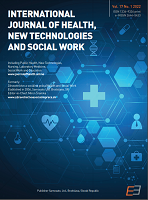Pressure intraperitoneal aerosol chemotherapy - will it change the fate of patients with peritoneal metastases?
Pressure intraperitoneal aerosol chemotherapy - will it change the fate of patients with peritoneal metastases?
Author(s): Vítězslav Marek, Štefan DurdíkSubject(s): Health and medicine and law, Demography and human biology
Published by: SAMOSATO, s. r. o., Bratislava, Slovensko - MAUREA, s. r. o., Plzeň, Česká republika
Keywords: Pressurized intraperitoneal aerosol chemotherapy (PIPAC); cytoreductive surgery (CRS); hypertermed intraperitoneal chemotherapy (HIPEC);
Summary/Abstract: Introduction: Pressurized intraperitoneal aerosol chemotherapy (PIPAC) is a novel drug delivery system able to induce regression of peritoneal metastasis (PM) in the salvage situation. Is PIPAC really that effective in eliminating peritoneal metastases? Core of work: Peritoneal metastases occur in patients with various primary cancers and are associated with a poor prognosis. The basis of treatment is systemic chemotherapy; however, the morbidity is significant and the survival benefits are modest. Cytoreductive surgery and hypertermed intraperitoneal chemotherapy are potentially curative treatments available to a minority of patients; however, most will develop recurrent disease. Recently, a new palliative treatment for peritoneal metastases, pressure intraperitoneal aerosol chemotherapy, has been introduced. Pressure intraperitoneal aerosol chemotherapy uses aerosol chemotherapy in carbon dioxide gas. It is installed in the abdomen under pressure through laparoscopic ports. No cytoreduction is performed. Intraperitoneal aerosol chemotherapy under pressure may be repeated at 6-week intervals. The review article provides an overview of the literature data and conclusions of renowned studies analyzing PIPAC Conclusion: PIPAC remains experimental treatment. Detailed prospective studies and close collaboration between scientists and oncologists are needed in the future to prove its effectiveness.
Journal: International Journal of Health, New Technologies and Social Work
- Issue Year: 17/2022
- Issue No: 1
- Page Range: 11-14
- Page Count: 4
- Language: English

